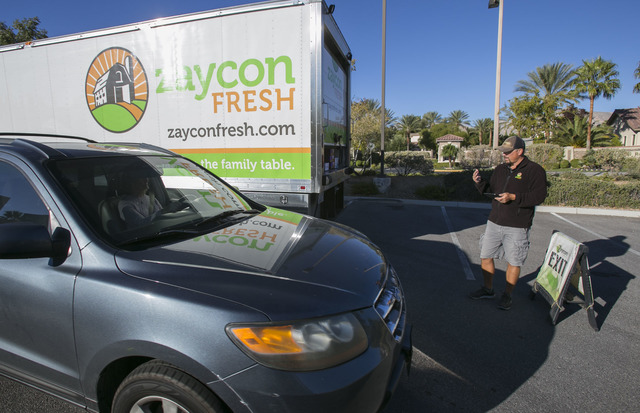Bypassing grocery stores, company delivers meat directly to consumers
The concept may seem strange. You get an email telling you to meet a guy in a parking lot — he’s already got your money, so no need to get out of the car. Just exchange pleasantries and pop the trunk so he can load you up with boxes of meat.
“The hardest part of my job is explaining to people what we do,” Keith Mitchell said while standing next to his refrigerated 10-wheeler on a recent delivery run through Las Vegas. “But once they try it, they get it, and then it just makes sense.”
Mitchell is a driver for Zaycon Fresh, a grocery alternative that delivers meat, in bulk, to customers in Nevada and across the country.
It’s a variant of the popular farm-to-table concept. Slaughterhouse-to-parking lot might be a more accurate description, though it lacks a certain marketable ring.
The way grocery stores work, meat from a ranch is shipped to a packager, then to a distribution hub where grocery stores pick it up and take it to their own distribution warehouse before it is shipped to stores. There the meat is again unloaded and eventually repackaged for sale to the customer.
Zaycon Fresh eliminates the grocery routes process, and loads its trucks straight from meat packer’s truck.
“I have no warehouses,” Zaycon’s 46-year-old founder Mike Conrad said. “I go direct to the customers, so the food is the freshest you can get. We don’t hold anything ever. We deliver it to you as soon as we get it.”
All these warehouse stops cost money, and introduce additional handling risks and potential temperature shifts. They also cost time — adding sometimes a week or more to the distribution pipeline — which takes its toll on overall freshness and nutrient levels.
Conrad was a down-on-his-luck mortgage broker seeking a career change in the face of a national housing collapse and recession in 2009 when he and his brother, a meat manager for a large grocery chain, conceived the concept and company.
By cutting out middlemen, Zaycon Fresh, based in Spokane, Washington, could deliver meats that were fresher and therefore tastier, and also less expensive. The only catch: for this to work, customers had to buy in bulk.
Zaycon made its first trip to Las Vegas in 2010, as part of an effort that delivered free chicken to 450 food bloggers, with Conrad and his brother renting two refrigerated trucks that they drove from Washington to Maine, and California to Florida.
The strategic social-media gambit resulted in a lot of online buzz and 28 truckloads of of orders. “That’s when I knew we really had something,” Conrad said.
Now the company has a fleet of 40 trucks crisscrossing the country with 1,200 drop-off points. Conrad said they currently have about 1,000 customers in Southern Nevada, where they make deliveries once or twice a month.
A Zaycon truck was in the Las Vegas area recently, delivering Alaskan sockeye salmon and Angus rib-eyes to customers who lined up in school and church parking lots in Las Vegas, Henderson and Boulder City.
Shonna Mayfield of Henderson drove up behind Green Valley Baptist Church Monday to pick up her box containing 25 pounds of salmon, vacuum-packed and freshly frozen.
She said she was part of a group of three families that went in together on the order, which cost $187.25.
“It’s just less expensive overall,” Mayfield said, “so that works for us.”
Price seems to be an important part of the draw, with freshness of flavor being what converts experimenters into repeat customers. Though prices vary, current offerings include 40-pound cases of ground beef for $111.60, 20-pound boxes of ham for $69.80, and 40-pound boxes of chicken ranging from $67.60 to $87.60, depending on the body part.
“This is as fresh as you’re going to get,” Conrad said, “unless you have a chicken coop — that’s going to be fresher.”
Conrad said Zaycon experimented with offering fruits and vegetables as well, but quickly realized the processes of transporting meats and vegetables for optimal freshness weren’t necessarily compatible.
Future plans could include collaborations with local farmers to bring produce to the meat delivery sites, to transform the event into a pop-up fresh food emporium.
“But that’s way down the line,” Conrad said.
Until then, they’ll just meet you in the parking lot.
























